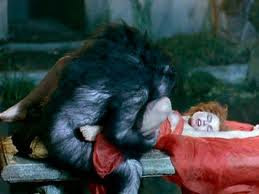Francis Ford Coppola's Dracula: over the top, vivid, Brechtian, crafty, hilarious, definitely not "Bram Stoker's".
It follows the novel no less closely than all the other adaptations I've seen, but its deviation is highlighted by the use of voiced-over text directly from the novel and many authentic details which contrast with a sense of style that seems rather out of place in a Victorian setting- but maybe it isn't all that much. For example, Gary Oldman as our favorite Count appears on the London scene with a decadent lavender suit and top hat with matching sunglasses. It turns out, sunglasses did exist in the 1890s, and some historians believe that doctors would commonly prescribe them to victims of syphilis due to sensitive eyes the disease supposedly incurred. The thought of syphilis is bound to sex: a sex-disease, not hard to connect to vampirism (as a Ms. Chou does here), another famous cause of sensitivity to light. This amounts to just one of many little detail loops that create this translucent curtain of sexual nightmare, tying together the perceived excesses in the final decade of two different centuries.
The extravagance of Dracula's costumes and decor is matched by the acting, especially Oldman's classic Romanian accent (complete with dramatic pauses as jolting as some people's impersonations of William Shatner) and Anthony Hopkins' cackling portrayal of Dr. Van Helsing. Tom Waits gets a surprising amount of screen time as Renfield, Drac's insane servant. Some people dislike highly theatrical acting in films, but I enjoy seeing a strong actor really go "out there". Also, it's hard to take issue with a lack of realism in a movie so expressionist in technique (not to mention the plot), and none of the weird performances have the dull ring of poor quality except for Keanu Reaves', who always sucks. Old-fashioned cinematic tricks with mirrors, autonomous shadows, and superimposed eyes add to the playful intensity.
While for most of the movie, at least, the narration is directly from the novel, much of the accompanying dialogue is not. This sometimes makes for humorous counterpoint, like when Mina(Winona Ryder)'s voice explains that "Lucy is a pure and virtuous girl" as Lucy fondles a man's bowie knife and exclaims "oh it's sooo big" etc., all this after the two girls giggle over illustrations of intercourse from Burton's 1001 Nights. The sexuality that the novel so obviously drips with is made beyond explicit by new inventions/interpretations: the girls' garden frolic in a storm becomes a make-out session (ambiguously under Dracula's influence); victims of the bite moan and convulse in orgasmic seizures; Dracula in some kind of batfaced gorilla monster form fucks Lucy on a stone alter before Mina's eyes; we are treated to an excerpt from a humorous Van Helsing lecture on venereal disease; and a passionate love scene between the villain and heroine wherein she hungrily licks and suckles a cut on his chest to become one with him, one like him. This last item is the culmination of an entire romance between Drac' and Mina (where the narrated text veers sharply from the original), perhaps long divined between the lines by close readers and deviant fans, which along with the origin story is the most significant departure from the novel. This original concoction has Vlad the Impaler's wife commit suicide during the Crusades, for which he curses God and is thus consigned to his demonic fate. Hundreds of years later he believes Mina is his wife's reincarnation or something (details here are vague), and certain aspects of the film seem to confirm this. But Dracula is highly hypnotic, and with the shadow of his claws and outline of his eyes plastered ubiquitously across the screen comes the constant suggestion that all of this is somehow under his control, the extent of which even he may not be aware. Whether or not Mina truly loves him or is just under his spell, they both believe it's genuine-- even in the end when she cuts off his head.
The Mina of the novel is an incorruptible paragon of virtue whose purity mobilizes and strengthens the small group of men who battle Dracula, her opposite, who is not portrayed as nearly so alluring or seductive as he is here. Simply put, she would not want to sleep with him. Hence my biggest qualm with the movie: its title. Bram Stoker, in his puritan angst that so informed the dark visions of the novel (which, mostly because of all this purity and virtue, goes downhill from roughly the same point the movie begins to turn away from its source) would have been disgusted. It's wonderful that the same myth can be told so often with such variety, and I believe top-billing should go to the storyteller: this is Francis Ford Coppola's Dracula.



No comments:
Post a Comment